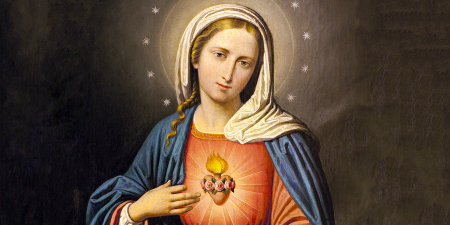
On the Feast of the Immaculate Heart of Mary: Mary and the Early Fathers
FREE Catholic Classes
Among the multiple and profound references to Mary, the Mother of God, found in the writings of the early Church Fathers is one of my favorites in the Cappadocian, Gregory of Nyssa who died in 356 A.D.

Highlights
6/25/2022 (3 years ago)
Published in Living Faith
Keywords: Mary, Immaculate Heart, Deacon Fournier, Church, Fathers
"What came about in bodily form in Mary, the fullness of the godhead shining through Christ in the Blessed Virgin, takes place in a similar way in every soul that has been made pure. The Lord does not come in bodily form, for 'we no longer know Christ according to the flesh,' but He dwells in us spiritually and the Father takes up His abode with Him, the Gospel tells us. In this way the child Jesus is born in each of us."
The early Christians knew that Mary's "Yes" (Fiat) not only changed history but reveals the meaning of the Christian vocation. During the praying of the Angelus while he was visiting Germany in 2011, now Pope Emeritus Benedict called the faithful to join their own yes to the "Yes" of Mary:
Learn more about Mary on Catholic Online School, 100% FREE!
"The Archangel Gabriel presents God's plan of salvation to the Virgin Mary, by which she was to become the Mother of the Redeemer. Mary was fearful, but the angel of the Lord spoke a word of comfort to her: "Do not be afraid, Mary, for you have found favor with God." So, Mary is able to respond with her great "yes".
"This "yes," by which she accepts to become the handmaid of the Lord, is the trusting "yes" to God's plan, to our salvation. And she finally addresses her "yes" to us all, whom she received as her children entrusted to her at the foot of the Cross (cf. Jn19:27)."
"She never withdraws this promise. And so she is called happy, or rather blessed, for believing that what was promised her by the Lord would be fulfilled (cf. Lk 1:45). As we pray this Angelus, we may join Mary in her "yes", we may adhere trustingly to the beauty of God's plan and to the providence that he has assigned to us in his grace. Then God's love will also, as it were, take flesh in our lives, becoming ever more tangible."
In these words, Pope Benedict continued the tradition of over two millenia in honoring Our Lady, Mary, the "Theotokos" in Greek. The Mother or Bearer of God. Below are two short insights from the writings of the Fathers on Mary, the Mother of God. There are many, many more.
In the year 130 the Bishop of Lyons, Irenaeus wrote concerning a theme common in patristic Marian reflections, that Mary was the "Second Eve":
"As Eve was seduced by the speech of an angel, so as to flee God in transgressing his word, so also Mary received the good tidings by means of the angel's speech, so as to be God within her, being obedient to this word. And though the one had disobeyed God, yet the other was drawn to obey him; that of the virgin Eve, the virgin Mary might become the advocate and as by a virgin the human race had been bound to death, by a virgin it is saved, the balance being preserved- a virgin's disobedience by a virgin' obedience." (Against Heresies, 3, 19 130 A.D.)
Years before, the great apologist of the second century, Justin the Martyr (110-165 A.D.) wrote:
"For whereas Eve, yet a virgin and undefiled, through conceiving the word that came from the serpent, brought forth disobedience and death; the Virgin Mary, taking faith and joy, when the Angel told her the good tidings that the Spirit of the Lord should come upon her, and the power of the Most High overshadow her, and therefore the Holy One to be born of her should be the Son of God, answered, Be it done to me according to thy word. And so by means of her was he born, concerning whom we have shown so many Scriptures were spoken; through whom God overthrows the serpent, and those angels and men who have become like to it, and on the other hand, works deliverance from death for such as repent of their evil doings and believe in him (Dialogue with Trypho, 100 A.D.)
Join the Movement
When you sign up below, you don't just join an email list - you're joining an entire movement for Free world class Catholic education.
A Lenten Message from Sister Catherine - Please Watch
- Easter / Lent
- 5 Lenten Prayers
- Ash Wednesday
- 7 Morning Prayers
- Mysteries of the Rosary
- Litany of the Bl. Virgin Mary
- Popular Saints
- Popular Prayers
- Female Saints
- Saint Feast Days by Month
- Stations of the Cross
- St. Francis of Assisi
- St. Michael the Archangel
- The Apostles' Creed
- Unfailing Prayer to St. Anthony
- Pray the Rosary
![]()
Copyright 2026 Catholic Online. All materials contained on this site, whether written, audible or visual are the exclusive property of Catholic Online and are protected under U.S. and International copyright laws, © Copyright 2026 Catholic Online. Any unauthorized use, without prior written consent of Catholic Online is strictly forbidden and prohibited.
Catholic Online is a Project of Your Catholic Voice Foundation, a Not-for-Profit Corporation. Your Catholic Voice Foundation has been granted a recognition of tax exemption under Section 501(c)(3) of the Internal Revenue Code. Federal Tax Identification Number: 81-0596847. Your gift is tax-deductible as allowed by law.






